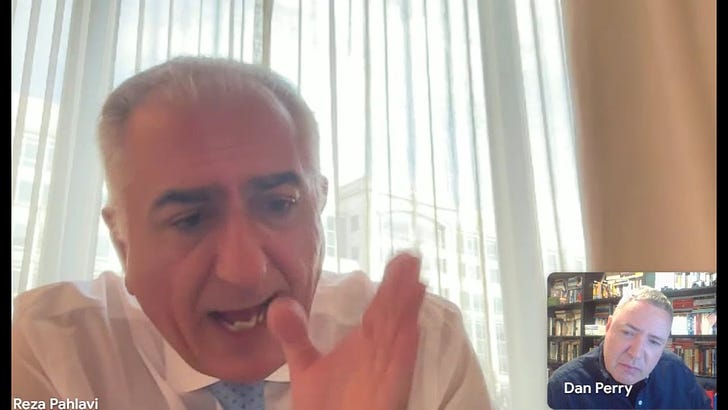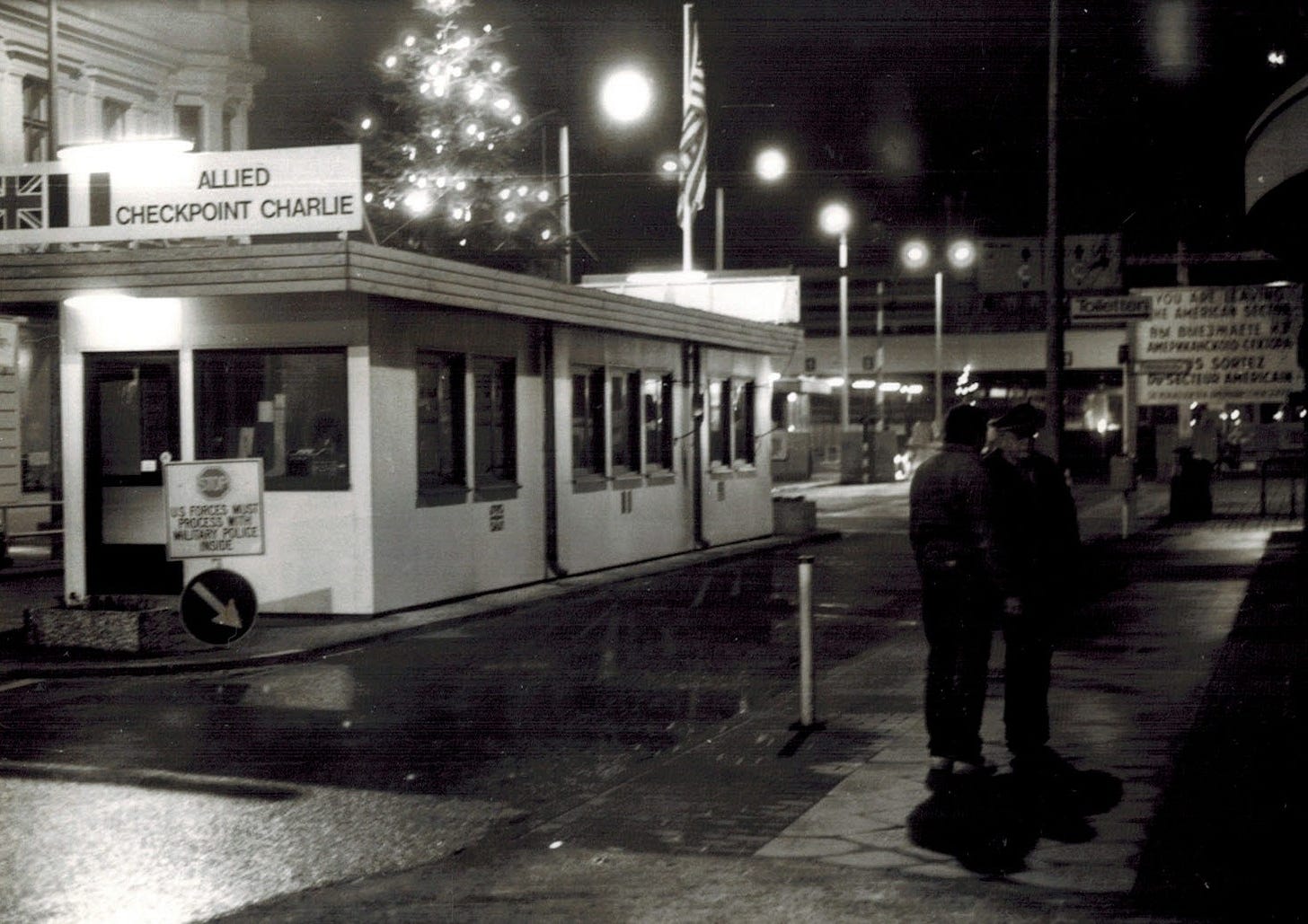Shah’s son says regime change possible, offers vision of Iran as West’s ally
Is the Islamic Republic too ruthless to be overthrown? Don't be so sure. Seemingly invulnerable despotisms crumble at first slowly - and then with lightning speed.
Some 45 years after the Iran hostage crisis, when US diplomats were imprisoned in the embassy in Tehran, Iran is still a hugely negative force in the world. As it spreads jihadist poison throughout the Middle East and menaces the world with a nuclear arms race, it can be hard to contemplate anything different for the country. But the son of the last Shah says a focused Western policy could help topple the Islamist regime, creating an ally.
In an interview (click on the above) from his base in Washington, D.C., Reza Pahlavi sketched out a tantalizing vision of a democratic Iran, with “total separation of religion and state,” prospering from ties with the West, at peace with Israel, and in harmony with its neighbors. “My only goal in life is to see to it that the Iranians can finally go to the election polls and vote their conscience and decide their fate,” he said.
It’s a remarkable posture for a man who still goes by the title Crown Prince and whose father, Mohammad Reza Pahlavi, ruled with an iron fist, propped up by Western powers and infamous for his reliance on secret police, until being overthrown in 1979. The 63-year-old son has distanced himself from that legacy and offers himself – by dint of name recognition and a certain nostalgist zeitgeist – as a transitional democratic leader who can guide the country through a post-theocracy phase.
Is it possible? Genuine opposition inside Iran itself is brutally suppressed, so there is no unifying figure in the country – creating an opening for someone well-known (indeed, ironically, a similar dynamic helped propel the Ayatollah Ruhollah Khomeini to power mere months after the Shah fled the country). If the moment for a decision ever actually comes, there will doubtless be howls of protests from those who remember the brutality of the Shah, especially in later years; but on the other hand, Pahlavi projects a genuinely inclusive and liberal worldview.
My conversations with Iranian dissidents suggest it may be viable – but far from a sure thing. What is clear is that among opposition circles, there is something close to total agreement on the need to end Iran’s absurd enmity toward the West (and especially ridiculously, the Jews).
Pahlavi said the U.S. had projected “weakness” with its efforts to engage the regime, since the Islamic Republic had radicalism in its DNA and cannot be cajoled into better behavior – like giving up its nuclear weapons program. “You should actually understand why it has to be regime change as a solution because at the end of the day, it's not the gun but the finger on the trigger. It doesn't matter what they sign. You can't trust them for a second.”
Pahlavi’s optimism, despite the seemingly unshakeable grip of the mullahs, rests on three pillars.
First, he believes the regime is loathed by at least 80% of the population, who not only would prefer Western-style freedoms but also look to countries like the United Arab Emirates, a few miles away from their shores across the Persian Gulf, and see the prosperity that has eluded them.
Second, he believes that once the people rebel, under the right circumstances they might be joined by key parts of the regime apparatus, including not only the military but also, critically, some parts of the Islamic Revolutionary Guards Corps – a sort of all-powerful Praetorian guard with a strong and corrupt presence in the economy. They would need be believe they would not be hounded by the new regime and even might play a role in the reconstruction.
“The top echelon is obviously benefiting from … the whole mafia structure,” he said. “But the majority of elements within the military of course the IRGC are not part of these benefitting from it. Some of them have to even have a second job to make ends meet in general. They want out but they are stuck … So one of the scenarios that will facilitate change which is part of my strategy is to include in the process of natural reconciliation and amnesty the maximum possibility of defections of elements tied to the regime.”
Pahlavi said even many Muslim clergy dislike the regime and are “feeling threatened or weakened, as a result of this regime that in the name of Islam have done so much harm.” Islam, he said, “has become not people's priority.”
He said South Africa’s “truth and reconciliation” process – transparent and rather forgiving – would be a model.
Third, he argues that all these local players must receive the right sorts of encouragement from the United States and the West – providing logistical and moral support to opposition movements, sanctioning regime elites without harming ordinary citizens, and tipping the scales in favor of a peaceful revolution.
Pahlavi called for “maximum pressure that includes even more sanctions, not just economic sanctions but targeted sanctions against officials, their bank accounts, freezing their assets, expelling their representatives or diplomats or people affiliated with the regime who are roaming freely in the Western world doing all the money laundering for the regime.”
In addition, he said the West should help fund opposition activity, especially strike actions, by releasing frozen Iranian funds to be earmarked for the purpose: “The quickest way to paralyze the regime is going to be across-the -board national labor strikes. But such labor strikes have to be funded… We're not talking billions of dollars having to be injected there, but policy has to change.” He also argued for engaging the Iranian people directly through social media to assure them of the positive future that awaits them once the regime is gone.
And yet, Pahlavi argued against direct Western military moves I recommended on these pages with former US security official Robert Hamilton: presenting Iran’s leadership with an ultimatum to stop nuclear enrichment and hand over enriched materials, halt missile development, and withdraw support for proxy militias – or else face blockades of its ports and destruction of oil installations and nuclear sites, for starters. Pahlavi said it would be better to at least try to encourage a change that comes from within Iran itself. “If we don't try this before resorting to the scenarios you've described you'll (lose) a very plausible and legitimate … scenario of change.”
Iran has already seen repeated waves of protests in recent decades, from the 2009 Green Movement to the 2022 movement after 22-year old Mahsa Amini died in custody. What’s missing, in his view, was decisive Western support that would exploit the weakness within the regime’s apparatus.
Pahlavi drew an interesting parallel with the fall of communism. In the late 1980s, it seemed impossible that the deeply entrenched communist regimes would ever fall. Yet, when the people rose up, regimes that seemed immovable crumbled with surprising speed. Indeed, in Romania it happened roughly in the way Pahlavi envisions, with the secret police and military forces that had propped up the dictator Nicolae Ceausescu abandoning him as the people’s uprising became impossible to suppress.
When regime change comes, he said, the new Iran would be at peace with Israel – especially since he expected without the threat from Iran’s myriad proxies in the region, including Palestinian rejectionists like Hamas, Israel would be more accommodating to the Palestinians. “Israel is the only exception in the Middle East as a democratic country. in comparison with everything else that we have, it could be an extremely important strategic partner to us,” he said.
Pahlavi seems convinced that the Iranian people — who despite the regime’s mismanagement remain educated, connected to the world via technology, and hungry for freedom — are capable of establishing a functioning democracy along any model, from a republic to a constitutional monarchy.
“Experts in their field right now are contemplating focusing on propositions, ideas and remedies. We have economists studying about what could be done – the first hundred days had we manage the country,” he said. “There's a whole host of people doing their part in these complex scenario and I am trying to assist as much as I can, and making sure that every component is in place.”
It’s tempting to believe it might come true – but is it human weakness that makes us grasp for an appealing scenario in the face of evidence to the contrary? I am not so sure. I visited Checkpoint Charlie mere months before the Berlin Wall came down – and I did not foresee the coming change. Few did. Horrible regimes crumble very slowly — then suddenly collapse.
"It could happen relatively fast," Pahlavi insisted. "The nation is ready. But they cannot be kept out there hanging without any other elements happening."
Here’s a transcript of the interview:
Keep reading with a 7-day free trial
Subscribe to Ask Questions Later to keep reading this post and get 7 days of free access to the full post archives.




